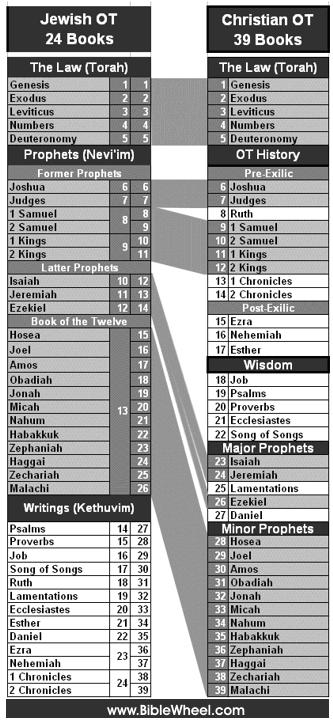
The Bible As Text: Authorial History, Translation and Compilation, and Issues of Interpretation
Hebrew Scriptures: Overview and Authorial History
Jews refer to their "Bible" or scriptures as the Tanach, an
abbreviation based on its three books: Torah (Teaching), Nevi’im (Prophets), and
Ketuvim (Writings). This organization also tells us the order in which the
books are believed to have been written. The name "Old Testament" implies there
is a new testament, so another common working name is "Hebrew Scriptures" or
"Hebrew Bible", since they were originally written in Hebrew (while the New
Testament was written mainly in Greek). ...but, of course, "bible" is just
he Greek for "book", so this term can be problematic for a people who were
conquered by the Greeks.
Authorship and Dates
The oldest extant fragments of the
Bible, the so-called
Dead Sea Scrolls (discovered between 1947-1979), date to 150-70 BC.
Much of these fragments is written in Greek, the common literary language of the
Hebrews in a land occupied by the Greeks for hundreds of years. (Edit: new
discoveries! Now the
oldest fragment is the Ketef
Hinnom: two tiny silver scrolls dating much further back, to c. 600 BCE.
Each contains a single prayer and is written in an ancient form of Hebrew.)
Until the discovery of the Dead Sea Scrolls, the oldest existing version of the Hebrew Bible dated to c 900 AD. That is roughly 2-3,000 years after the events were supposed to have taken place.
Until 100 AD, no complete, widely accepted version of the Hebrew Bible existed. Discovery of the Dead Sea Scrolls show that, as within the Christian tradition, various and even competing books of the Hebrew scripture were once considered canonical and that variations exist in the canonical texts; in other words, the process of writing the Bible took over 1000 years -- and perhaps up to 2000 years -- and involved many variations and changes.
The Torah (Teaching) – or Pentateuch, Greek for “Five Books” or “Five Scrolls” – consists of Genesis, Exodus, Leviticus, Numbers and Deuteronomy.
It was originally
held by both Jews and Christians to have been written by Moses (and is often
still referred to as the Five Books of Moses) but is now commonly believed to be
compilation of several sources, composed over hundreds of years. For an in
depth look into this, see:
Who Wrote The Bible by Richard Friedman. The
process of writing down and compiling the Scriptures is now believed to have
been begun in Babylon, after the Babylonian King, Nebuchadnezzar, had captured
and then destroyed Jerusalem and driven the Israelites into exile (mainly into
Babylon itself) (c586 BCE).
Genesis, Exodus: c. 1200-800 BCE
(See the Timeline for the historical events)
Deuteronomy: c . 600 BCE
Leviticus, Numbers: c. 550-400 BCE Some elements c 800 BCE
The Nevi’im (Prophets). These books begin where the Torah leaves off, with the conquering of Canaan by Moses’ successor, Joshua, and the establishment of the monarchy.
Ketuvim (Writings). As the title suggests, this is a wide ranging collection of texts. Some of the oldest perhaps predate the Torah, while others – including Job, the Song of Songs, Ruth, and many of the Psalms – were likely composed c 450 BCE.
The People Of The Book
It's important to keep in mind that the Hebrew scriptures are the common book (or books) uniting not only Christians to Judaism, but Muslims to Christians and Judaism; this is the one book all three branches of this faith hold in common.
Notably, however, Judaism orders the books differently than Christian tradition, so in the Hebrew scriptures God does not speak again after the Book of Job; Job is the last character to which this character, God, ever speaks. Toward the end of the scriptures, He also does not intervene in human events.
Christians, however, order the books differently, and this difference significantly changes the story; God speaks to and intervenes in human events right up to the last page of the "Old Testament". These are exactly the kinds of significant differences a course in the literature of the Bible is interested in: how writing changes meaning.
In this case the different order, though meaningful in terms of how the stories unfold, is likely an accident of history: ancient people normally kept texts as scrolls, but the Romans began binding books (or "codex") roughly about the time Christianity and the Christian "bible" became just that: a book (c. 100-300 AD). Of course once a codex or book is bound it retains a given order, while of course scrolls get shuffled in a box (or "ark") in a varied order.

See next:
Translation Issues